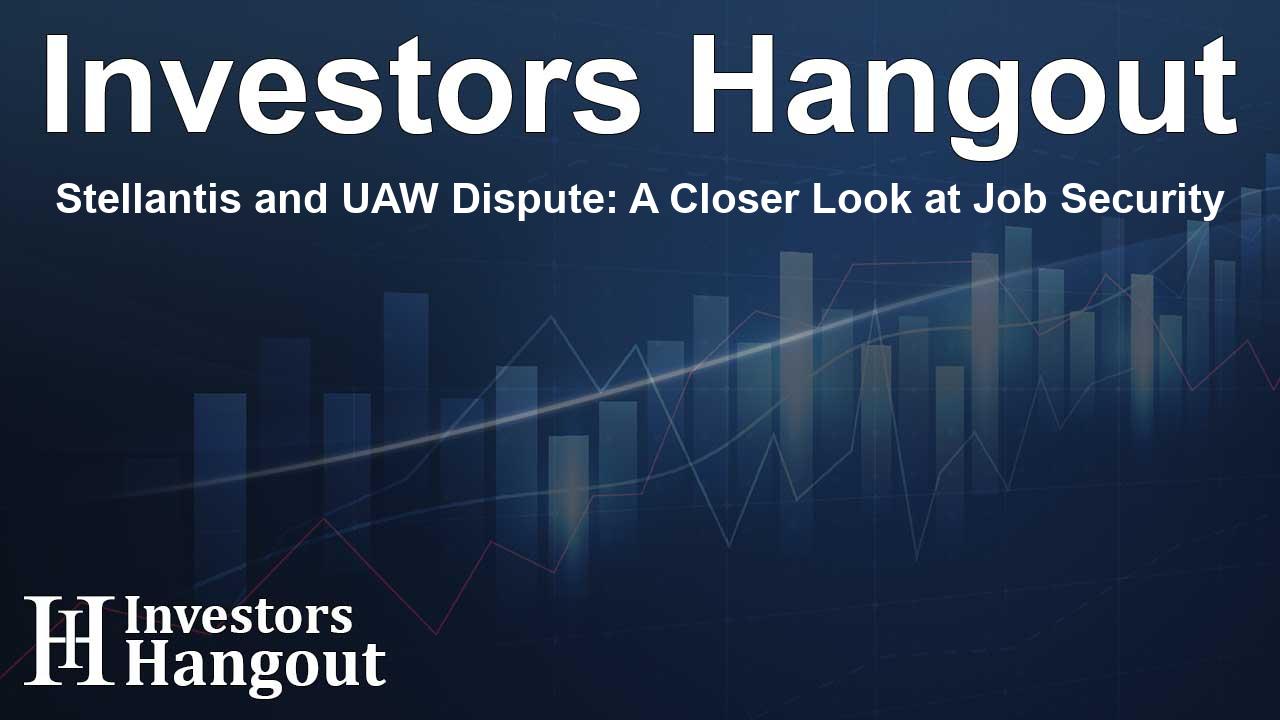Stellantis and UAW Dispute: A Closer Look at Job Security

The Tensions Between Stellantis and UAW
In the automotive industry, labor relations often come with their share of challenges. The ongoing dispute between Stellantis and the United Auto Workers (UAW) exemplifies this situation. Workers like Ruth Breeden, a Ram truck assembler, voice their concerns that this standoff could impact not just their jobs but also act as a warning for all UAW members nationwide. With over 2,700 jobs at risk, the uncertainty surrounding the company’s factory commitments is troubling for many employees.
Delays in Stellantis's Commitments
Stellantis previously vowed to reopen a factory in Belvidere, Illinois, as part of its contract with the UAW. However, anticipated reopening plans have faced delays due to what the company calls 'unfavorable market conditions.' This lack of clarity about when exactly the factory will reopen, along with plans for a new battery plant and parts warehouse, leaves many workers apprehensive about their futures.
At a recent union rally, Breeden captured a common sentiment when she asked, “Who knows which plant is next?” The threat of strikes looms, and experts have noted that Ford and General Motors are closely monitoring this situation as they consider their own future strategies.
Job Security: A Wider Perspective
Historically, American manufacturers have been shifting production to areas with lower labor costs, such as Mexico. This ongoing trend has heightened the demand for transparency and accountability from automakers like Stellantis. In the aftermath of a previous strike at a Ford truck plant, company leadership hinted that they might rethink where to locate future vehicle production—suggesting that job relocations may be driven purely by financial considerations.
Stellantis's Investments and Future Strategies
Initially, Stellantis's promise to reopen the Belvidere plant received significant praise and even led to a visit from a notable political figure. The company committed over $18.9 billion to U.S. operations, signaling a dedication to its workforce. Yet, despite agreements to launch new assembly lines for electric and gas-powered vehicles, many union members are starting to feel these promises may be overlooked.
The union is increasingly focused on ensuring Stellantis is held accountable for its investments and that American jobs aren’t sacrificed for profit. In discussions, Stellantis reiterated its commitment to these plans but emphasized that fulfillment depends on market conditions and consumer demand. This phrasing has raised eyebrows among UAW representatives, who argue that recent labor contracts include provisions allowing for strikes over unmet commitments.
The Economic Environment and Competitive Pressures
Stellantis has faced its share of economic challenges, with a nearly 16% drop in U.S. sales. This downturn has complicated the fulfillment of earlier promises, leading to profit losses and heightened competition. Workers argue that if Ford and GM can find ways to succeed, then Stellantis should also be able to thrive under similar conditions.
Looking Forward: The Future of Labor Relations
As tensions rise, it seems the UAW is bracing to assert its influence, utilizing lessons from past disputes as a foundation for negotiations ahead. Breeden and her colleagues are eager for communication from Stellantis about what comes next, hoping for a future built on mutual respect. While the possibility of strikes looms, union leaders are firm in their commitment to hold the company accountable for its promises.
Ultimately, the outcome for Stellantis and its workers won't just depend on the company's immediate actions—it will also hinge on the broader relationship dynamics between labor and management in the U.S. automotive industry. The future of that relationship will play a key role in shaping jobs, investment, and the overall vehicle production landscape in the country as both sides work through these difficult times.
Frequently Asked Questions
What are the main concerns of UAW members regarding Stellantis?
UAW members are primarily worried about job security, potential plant closures, and whether Stellantis will uphold its commitments made in the labor contract.
How have Stellantis's financial difficulties contributed to employee concerns?
The significant downturn in U.S. sales and profits has raised concerns among workers about Stellantis's ability to honor its promises related to investments and job security.
What actions are UAW leaders considering in response to the dispute?
Union leaders are contemplating the possibility of strikes if Stellantis fails to meet its commitments, in accordance with the provisions outlined in their contract.
How has the market affected Stellantis's commitment to reopening its plants?
Adverse market conditions have caused delays in reopening the Belvidere plant and in fulfilling promises linked to new investments, raising alarms among employees.
What does the shifting automotive production landscape mean for this situation?
The trend of manufacturers moving production to lower-wage countries has intensified fears among UAW members about job security and the availability of future opportunities within the U.S.
About The Author
Contact Olivia Taylor privately here. Or send an email with ATTN: Olivia Taylor as the subject to contact@investorshangout.com.
About Investors Hangout
Investors Hangout is a leading online stock forum for financial discussion and learning, offering a wide range of free tools and resources. It draws in traders of all levels, who exchange market knowledge, investigate trading tactics, and keep an eye on industry developments in real time. Featuring financial articles, stock message boards, quotes, charts, company profiles, and live news updates. Through cooperative learning and a wealth of informational resources, it helps users from novices creating their first portfolios to experts honing their techniques. Join Investors Hangout today: https://investorshangout.com/
The content of this article is based on factual, publicly available information and does not represent legal, financial, or investment advice. Investors Hangout does not offer financial advice, and the author is not a licensed financial advisor. Consult a qualified advisor before making any financial or investment decisions based on this article. This article should not be considered advice to purchase, sell, or hold any securities or other investments. If any of the material provided here is inaccurate, please contact us for corrections.
